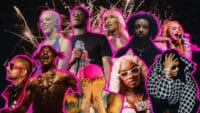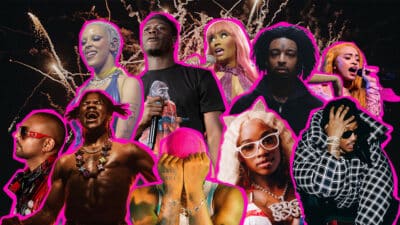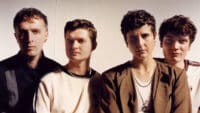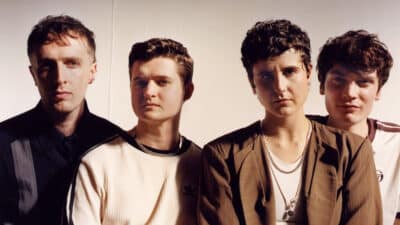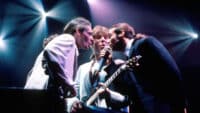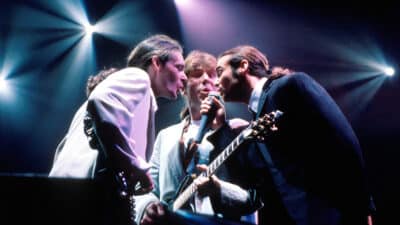Interview
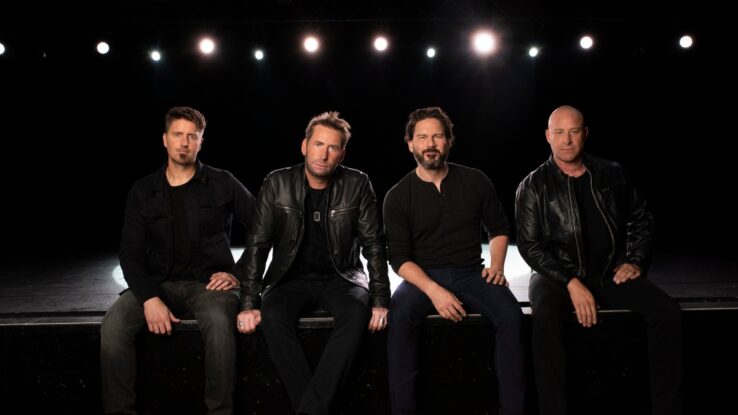
Interview
Stage Times: Nickelback
In celebration of their new Hate To Love documentary, we sat down with the band to talk about their weirdest, wildest and most memorable live performances
The Nickelback documentary has been hovering around for some years now, ever since the band first hinted that they had been capturing behind-the-scenes content. In a conference room in Soho House, Mike Kroeger and Ryan Peake mull over the question of why now is the moment to release the film out into the world. Peake pauses. “You want the truth?” We do. “We’re lucky idiots. That’s the biggest part.”
“Looking back on the timeline of the creation of this documentary, it started by accident,” says Kroeger. “We filmed some stuff, we said, ‘That looks pretty cool. Maybe we’ll shoot some more’. And that was seven years ago. Then it was like, ‘Well, let’s just bring the cameras out to the studio. Let’s bring the cameras out to a show somewhere. Let’s bring the cameras on tour. Let’s just keep bringing the cameras.’ And then we got to a point where someone went, ‘Are you guys going to ever release this?!’
“After six, seven years, it kind of got absurd. Like, are we just gonna shoot this till we die and then let somebody else make it?!”
There were multiple false starts when it came to getting Hate To Love out into the world. “Ryan would go on the socials, and he would announce, ‘This documentary’s shot and it’s coming out real soon, a couple months from now,’” recalls Kroeger. “Five years later, we’re still doing it. I remember him saying, ‘I’m starting to really look like an asshole here, you guys…’.”
Despite the delays, the timing of it all is ‘serendipitous’, as Peake puts it. “We were going to release it in 2020, and if we’d actually done that, I don’t know if it would have connected,” he says. “We started to see things turn for us online where people were softening; they were kind of getting tired of this internet reputation that we had somehow garnered for ourselves,” he says. Post-pandemic, the band started to find a new audience through TikTok. “I truly think that the people were ready to listen to our stuff again. The streams were going up and up and up. And we hadn’t done anything.”
Even after seven years of shooting, the band waited as long as they could before handing the film over, choosing to capture content right up until their most recent tour. “We’ve never been great at deadlines,” laughs Kroeger. “We as a band would rather be late with a good thing than on time with a mediocre thing. Whether you think Nickelback music is art or not, art takes time. If you rush it, you’ll get what you pay for. We never wanted to do that. That’s not to say that we’re painting the Mona Lisa or something like that… but we do our best work on our schedule, not everyone else’s. We’d rather wait and delay, and maybe people are pissed off and maybe some timelines get screwed up but at least then we know it’s ready to the point that we’re happy with it.”
“That’s the short answer,” says Peake.
To celebrate the release of the documentary, we caught up with Kroeger and Peake to talk about their biggest, best and most formative live performances.
The gig that made us want to play music
Kroeger: Chad and I have the same show, and that was Metallica with the Cult in Calgary at the Saddledome on the And Justice For All tour. We saw something happen up there. Now that I think back on it, it was just another tour date for Metallica and the Cult. They probably didn’t know what city they were in, because they’d been on the road for a year and a half already. But to us, we saw two things. My brother will tell you that at that show, he saw rock stars being rock stars and doing something so big that he just couldn’t believe it. They were titans. To me, it was four guys in jeans and t-shirts playing guitar and playing rock. And I thought, “I think we can do that. I can do that. These are just guys. This is actually possible.”
Peake: The jeans and t-shirt thing – that’s always been a draw for me. I just don’t want to have a gimmick. And if you’ve got one, that’s fine, I’m not speaking poorly about that, it’s just it’s not something I want. It wasn’t ever my thing so I was really happy we were able to achieve that.
I just loved music. I loved live shows. But if I think about it, I don’t know if that really spurred me so much as watching my dad play. He played in a working weekend band all the time. So I knew it was possible to do it. He showed me that it was absolutely possible. My house was filled with music, my whole childhood. It wasn’t necessarily stuff that I stuck with, because it was all country music the whole time. But I liked it, I didn’t like it, I got away from it, and then I kind of gravitated back to it. Now I like absolutely everything. But I think he showed me it was possible. Of course I could do this. To what degree? That’s up to everybody else.
The first
Peake: I remember it very well. It’s in the movie. I didn’t think of it. Nobody thought of it. Except for one guy: my brother, Jason.
Kroeger: Jason is the unseen hand in the background that’s doing things. He didn’t want to be in the doc, but he should be recognized for what he’s done for us.
Peake: So you’ll see some footage of a camera kind of above us, looking down, and it’s shot on an old VHS camera.
Kroeger: And it was rough, in real time.
Peake: Oh, Jesus, it was rough in real time.
Kroeger: I’m glad the audio quality is terrible, because I wouldn’t want people to hear too clearly what we’re doing.
Peake: That first show was the reason we moved to Vancouver. Mike was already there, and we were in Alberta, doing our respective dead-end jobs. This manager heard the EP we had and said, “I can get this on the radio, and I can get you a gig opening for a band at the Town Pump.” The Town Pump is a place in Gastown, and it’s an institution in Vancouver. It’s not a giant club, but it’s a great place to play. We opened for a band called Rust out of the States. My brother came up for the show and filmed it. He shows us this and I’m just laughing because we have hardly any archive footage. We don’t do video. I don’t even take pictures.
Kroeger: No, we don’t, we’re the worst.
Peake: We’re definitely not the Beatles, in many ways, but the Beatles have so much footage. It’s insane how much they recorded. But that show started everything. How cool to have that on video.
The worst
Peake: This is another thing my brother did. We were playing NXNE in Toronto. They booked us this place called the Opera House, which holds 800 people. For a good band. So we went up there, we got on stage, and there might have been 40 people there. And 40 people at an 800 seat venue looks pretty terrible. Thank god there were no cameras.
Kroeger: Put it this way – I fell off the stage. And I didn’t fall into anyone.
Peake: I saw 35 guys in the audience in dress shirts and ties. I thought, really? My brother was going to chiropractic college out there. So he got all the chiropractors to come down, as many as he could. Chad’s on stage and he calls the radio station in Vancouver called CFOX, and he says, “Hey, we’re here in Toronto, NXNE is going crazy. Do you want to hear everyone? Do you want hear Toronoto?” I’m just like… oh no. And they just scream and yell.
We go back to Vancouver and CFOX were saying, “Nickelback’s made it in Toronto”. It sounded like we were playing to 1000 people. So much of the music business is theater, right? It’s not that we were even totally trying to do that, but suddenly we seem like a bigger band. Then other guys started to book us, and I have to thank Jason for that because it would have been a disaster. We wouldn’t have made that phone call.
Kroeger: Like a lot of things in the entertainment world, the truth could have ruined us.
The smallest
Peake: Our PR guy used to live in a ski town called Banff, Alberta, and I was telling him that we once played a bar called Wild Bill’s. He was like, “Oh, I bet there were like four people there?” I told him no. There was nobody. We played for staff that night.
Kroeger: When you play in a band, you play for waitstaff. Sometimes, that’s all you play for. We got lucky – we had some some stuff catch on and we eventually got to play for more than waitstaff. But I played in other bands before Nickelback. I played for waitstaff a lot.
The biggest
Peake: It’s either Rock In Rio, or it’s Festival d’été in Quebec City, which was… 110,000?
Kroeger: Yeah, something like that. Rock In Rio is in those numbers as well. But if you include the biggest audience we ever played for, that’s when we played the closing ceremony in Vancouver for the 2010 Winter Olympics. There were 60,000 people in the house, but there was a viewing audience on television of a billion.
How much do you think about that viewing audience when you’re playing a gig like that?
Peake: I try not to think about it at all.
Kroeger: I didn’t know about it until after the show. We watched the hockey before. It was the last event, and Canada won the gold medal. Then we literally got up from our seats, walked across the street and put on our gear and played. That game was so consequential and so tense that it shaved three or four years off my life. When we came to play, it was like, “Well, this is easy. I mean, what we did there watching that match, that was way harder than what we’re gonna do now”. And then somebody came backstage and said, “Yeah, the television audience was over a billion people for your show.” I was like… I should have been afraid.
Peake: Stereotypical Canadian. “Oh, the hockey was so stressful…”
The weirdest
Peake: We played this little gig in a strip mall in Laval and we got in there at like three, four in the afternoon, and it was like a pub almost – it wasn’t a venue so much. It had a brass bar. We’re setting up and we play two or three songs for soundcheck, then the bartender comes over and says, “Guys, can you not play tonight? You’re scaring my customers away.” And he goes away and he comes back with this milk crate. He’s like, “I’ll take care of the hotel rooms and order a couple of pizzas, but please just don’t play tonight. And here’s some percussion instruments, some tambourines, a music book and some drumsticks that the old bands left”. He’s giving me these; he’s trying to be conciliatory. Normally, that obviously would have been pretty insulting. But we were so tired from the road, we were just like, “Yeah, that’s great. That’s fine. We’ll just take the night off”.
Kroeger: We were gonna hurt his bottom line. He could tell no one was coming. So there’s like six or eight old guys sitting in the bar drinking, and the regulars just said, “Hey, if this sh*t keeps going, we’re leaving”.
The best
Kroeger: The Rock In Rio show of 2019, which happened to be our last show before the pandemic restrictions, I think was one of my favourites. It just felt great. And there were so many people there. South American fans are different. They’re very passionate. They’re louder and more demonstrative I think than most audiences in the world.
Peake: It’s funny, because the Rock In Rio show in 2015 I enjoyed immensely more than that one. And it’s not the fans’ fault. It was my experience on stage. But I would say, for me, we did a show at a place called Studio Coast in Japan. It was kind of our return to Japan, because we went and played, and then we didn’t come back for like seven or eight years. And then we came back to play two nights in a small club, 2000 capacity, that we sold out both nights. We go up, and we start to play. Japanese crowds are usually pretty measured, but these guys were just losing their minds. I’d be playing to the crowd and then I’d turn back to the guys like, “What the…”
Kroeger: We all did!
Peake: I’m trying to look like a tough guy rock star, and I turn back, and I’m like, “Holy sh*t!”
Kroeger: I did the same thing. Chad’s in the middle, we were both leaning round him like, “Holy sh*t. What the hell is going on?” They were hitting the barricades so hard. It looked like it was gonna break.
Peake: It was intense. It was an unbelievable show. Things like the Rock In Rios are great. Fantastic. But the fact that we could still get excited about playing in a small venue like that, and get that from a crowd… As a band, that’s what you do. You look for that, you feed off that. It obviously goes both ways. We feed off it and we give more back. And, you know, you get stuck in the hamster wheel sometimes – it can kind of be a bit routine. So to have that wake you up is gold.
Kroeger: That was shocking, though; that was really, really unexpected. The sentiment going into that Studio Coast show was, “you guys played the big place last time, but that was a long time ago, and we don’t really think you really have that much of a draw anymore. So if you want to come back to Japan, we’re gonna take the safe conservative route.” So we kind of expected to sell out the smaller place but the thing that doesn’t show up on ticket sale numbers is the enthusiasm. That was surprising. That was exceptional.
What’s better for you then, a smaller venue packed with very enthusiastic fans or a massive show with less of a buzz?
Peake: For me, they’re just very different. I prefer going to smaller shows as a fan. But it depends on who you’re seeing, right? We saw Coldplay in Brisbane and it was just amazing. Then I saw U2 at the stadium in Vancouver for the 360 tour. And I just caught their Sphere show, which felt more intimate because of the venue design. They were all amazing.
It’s a tough question to answer because I like small shows when you’re close to people, and sometimes it feels more powerful. The bigger shows are different because you’re kind of manipulating – in a good way – the crowd and working out how to get everybody singing. You can kind of pay attention to everybody, you can make a bigger spectacle of things… I don’t know if there’s a right answer to that. I think they both have their value.
Kroeger: The small ones will always sound better. Playing the bass, I’m a real big fan of the lower frequencies. When you’re outdoors that just disappears. Because you don’t get any sound pressure level, right? When you’re in a building, it is just a tighter, stronger sound. However, the bigger ones, you can actually hang a big show. You have more lights, you can have more video. As far as how it feels, I love playing big live shows. These big festivals are really cool. But I like the way the smaller ones feel better. I feel a more potent reaction from the audience. I love it all.
Hate To Love: Nickelback is now showing in cinemas.
Nickelback’s Get Rollin’ tour comes to the UK this May. Find tickets here.




